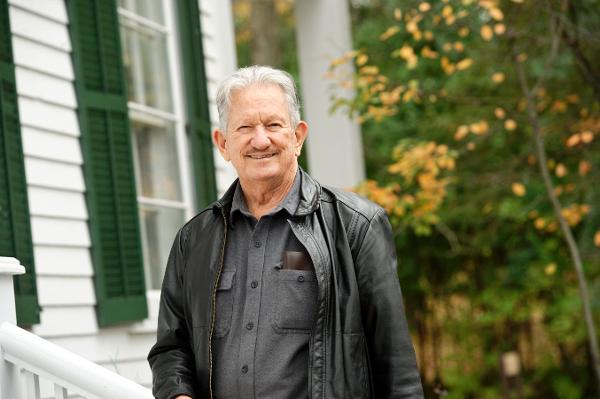Necrology
Because Hamilton Remembers


Rand U. Carter
Sep. 17, 1937-Jun. 12, 2025
Professor of Art History Emeritus Rand Urban Carter died on June 12, 2025. Born in Corpus Christi, Texas, on Sept. 17, 1937, he showed an interest in music and architecture from age 6, when he began the study of piano and, later, the cello. He participated in a children’s theatre company and continued to perform through high school. During these years, he was also a regular panelist on the radio shows Teen Topics and Teen Tunes, later boasting, “I was a teenage disc jockey.”
In 1955, Rand entered Columbia University where he continued his piano studies. According to a published obituary, “His interest in the history of art was awakened and, after exhausting the undergraduate offerings, he persuaded [British art historian] Rudolf Wittkower to accept him into his graduate courses. He hosted a weekly radio program on WKCR called ‘Let’s Talk Books’ and broadcast reviews of stage plays, Broadway shows, opera, and concerts, an assignment that gained him free admission to New York’s hottest tickets. He later remarked, ‘It’s amazing that I was able to graduate, but the stimulation kept me going.’”
With his undergraduate degree in hand, Rand continued his education in art and archaeology at Princeton University. He was especially fond of Professor George Rowley, an expert in Chinese art, and spent much time in Rowley’s conservatory examining Renaissance drawings and Chinese rubbings, according to the obituary. During the summer of 1961, he worked at the Alan Gallery on Madison Avenue in New York City, where he made the acquaintance of many of the leading figures of the art world.
After completing his M.F.A., Rand was awarded a Fulbright grant to study at the Courtauld Institute of the University of London. In 1962, he took a position as assistant professor of fine arts at the Royal Institution for the Advancement of Learning (McGill University) in Montreal. His subsequent doctoral research was supervised by Sir John Summerson, keeper of Soane’s Museum.
Rand completed is doctorate from Princeton in 1966 and joined the Hamilton faculty in 1970. He taught on College Hill for 47 years — 15 of those as chairman of the Art Department — where his teaching interests included European art of the 17th, 18th, and 19th centuries; neoclassicism; the history of furniture; the environmental and ecological implications of architectural design; and urban planning. He also helped establish the concentration in art history.
In 1981, Rand co-edited a facsimile edition of Karl Friedrich Schinkel’s Sammlung architektonischer Entwürfe on the occasion of the Prussian architect’s 200th birthday. He also provided chapters for several books and published numerous scholarly articles, reviews, and exhibition catalogues, along with three guidebooks to the architecture and sculpture of Utica. Rand lectured across North America, as well as the Dominican Republic, England, Denmark, Germany, and Italy. In 2006, he was invited to speak at a conference on “The Venice Charter Revisited” at the Venice Biennale.
Professor Carter’s colleagues described him as “an outspoken and articulate advocate of the arts at Hamilton College,” with a “high calibre” publication record. Another said he was “a demanding teacher, deeply concerned with the process of learning. … Every aspect of his teaching … conforms to his view that a liberal arts education should be based on thoughtfulness, exactness, and breadth of learning. … I know that my teaching is better as a result of having worked with him.”
Rand was also interested in historic preservation, and he contributed his knowledge and expertise to the preservation of Hamilton’s campus and landscape, and locally with the Landmarks Society of Greater Utica, for which he served as president and was presented with a Distinguished Service/Lifetime Achievement Award in 2011. The citation recognizing his service read, “Rand is a passionate advocate for heritage structures and sites, who promoted responsible historic preservation practices well before it was fashionable. His knowledge and guidance have helped many historic property owners to maintain their properties, thereby adding value to the quality of life for the city’s residents while protecting our irreplaceable buildings and districts.”
Following his retirement in 2017, a number of former students — from the classes of 1971 through 2015 — organized an event to honor their teacher, mentor, and friend. Michael Shapiro ’71, former director of the High Museum of Art in Atlanta, summarized Rand’s impact on his students: “[O]nly at a small college could many warm personal relationships over many years be nurtured with a professor.”
Rand served his community on the boards of several arts organizations, including the Players of Utica, the Utica Symphony, the Clinton Symphony, and the Chamber Music Society of Utica. He was president of Sculpture Space (Utica) and the Landmarks Society of Greater Utica. He chaired Utica’s Commission on Scenic and Historic Preservation.
Devoted to his Orthodox faith, Rand was an avid traveler, having visited every continent except Australia. He especially enjoyed traveling in Egypt, which he considered his second home.
Predeceased by his brother and sisters, Rand Carter is survived by his brother, his niece, nephews, grandniece, grandnephews, as well as extended family, friends, and colleagues.
Note: Memorial biographies published prior to 2004 will not appear on this list.
Necrology Writer and Contact:
Christopher Wilkinson '68
Email: Chris.Wilkinson@mail.wvu.edu

The Joel Bristol Associates
Hamilton has a long-standing history of benefiting from estate and life payment gifts. Thoughtful alumni, parents, and friends who remember Hamilton in their estate plans, including retirement plan beneficiary designations, or complete planned gifts are recognized and honored as Joel Bristol Associates.
